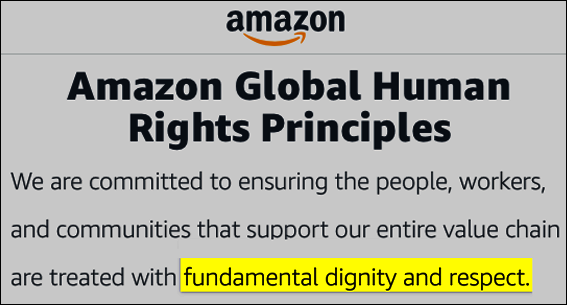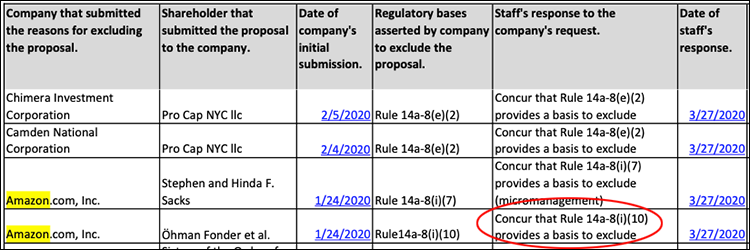
A month before Amazon workers’ scheduled strike today for better health and safety protections during the coronavirus crisis, Amazon lawyers successfully convinced the Trump administration to bless a move killing a shareholder initiative designed to force the online retailer’s executives to better safeguard employees, according to company documents.
Amazon was facing the potentially embarrassing public spectacle of a shareholder vote on the resolution to require the company to commit to a detailed plan for “ensuring safe and healthy workplaces; prohibiting discrimination and retaliation (and) affirming the right of workers to form and join trade unions and bargain collectively.”
In response, the company petitioned the Securities and Exchange Commission to approve of its decision to exclude the resolution from its proxy statement at its annual shareholder meeting. The company argued the resolution was unnecessary because it had already “substantially implemented the proposal by adopting and posting on its website the Amazon Global Human Rights Principles” -- a statement in which the company says: “We strive to be the most safety-centric organization in the world.”
And yet only a few months after that statement was published, Amazon employees in the United States were asserting that the company was not doing enough to prepare for a coronavirus outbreak and protect workers. On March 26, CNBC reported that it had spoken to a dozen workers afraid to show up for work during the coronavirus outbreak.
A day later, the SEC -- which is led by Trump appointees -- blessed Amazon’s move to exclude the shareholder resolution, according to agency records.

Three days after the SEC ruling, Amazon reportedly fired a warehouse worker who organized a strike to demand the company close and sanitize its Staten Island facility after an employee there tested positive for coronavirus, according to CNBC.
An Amazon spokesperson confirmed that the shareholder resolution will not be on the company’s proxy statement, which means it will not be up for a vote at the company’s upcoming shareholder meeting later this month.
An investment official at the firm pushing the resolution said the public health emergency underscored why the resolution is necessary.
“Seen in the light of corona, it is evident that Amazon need(s) to step up and ensure they run the company in line with international guidelines on labor rights,” said Fredric Nystrom, head of responsible investments at Öhman Fonder, a Swedish asset management company that led a coalition of Amazon investors supporting the initiative. “For us as shareholders, labor rights (are) connected to profitability and long term growth. We think it is a mistake to think short term considering the situation we are in.”
“We Do Not Believe Unions Are In The Best Interest Of Our Customers”
In recent weeks, Amazon workers have alleged that the company is not taking adequate steps to protect them during the coronavirus crisis and retaliating against them for speaking out -- all while its CEO Jeff Bezos has reportedly increased his personal wealth by $24 billion. At the same time, Business Insider reported that Amazon-owned Whole Foods was aggressively tracking which of its stores might be most susceptible to unionization.
Those complaints follow earlier allegations that the company has undermined unions and ignored safety concerns.
In 2018, Gizmodo published a leaked Amazon training video for workers that declared: “We do not believe unions are in the best interest of our customers, our shareholders, or most importantly, our associates. Our business model is built upon speed, innovation, and customer obsession -- things that are generally not associated with union.”
Last year, the Atlantic and the Center for Investigative Reporting published an expose on worker injuries in the company’s warehouses.
“Failure To Make A Clear Commitment On Worker Health And Safety”
That ongoing labor strife was context for Öhman Fonder filing its shareholder resolution on Nov. 6, 2019, on behalf of itself and a coalition of investors that included BMO Asset Management, Providence Trust and the Folksam Group.
“There have been several reported incidents over recent years of poor working conditions, with workers having engaged in strikes around Prime Day and Black Friday to protest working conditions, and have alleged retaliation for speaking up,” said a draft of the resolution emailed to Amazon counsel David Zapolsky. “These concerns about Amazon’s labor rights record have negatively affected Amazon’s social license to operate and may interfere with its growth strategy...We believe that it is important for Amazon to commit publicly to respecting labor rights in its own operations.”
According to Reuters, Amazon published its Global Human Rights Principles soon after. The document states: “We value worker feedback. We firmly believe it is in our employees’ and the company’s best interests to continue our direct communications, and the best way to effect positive change is for our employees to continue working directly with their managers throughout the company. We respect freedom of association and our employees’ right to join, form, or not to join a labor union or other lawful organization of their own selection, without fear of reprisal, intimidation, or harassment.”
On the topic of safety, the company wrote: “We provide a clean, safe, and healthy work environment. The health, wellness, and safety of our workers is our number one priority. Everyone has the right to a safe and healthy workplace with appropriate rules and practices for reporting and preventing accidents, injuries, and unsafe conditions, procedures, or behaviors.”
Citing the statement, Amazon’s lawyers in January asked the SEC to concur with its decision to exclude the resolution, arguing that the initiative was redundant.
“In summary, the Amazon Global Human Rights Principles already address all of the elements of the policy requested by the Proposal and its essential objectives,” the lawyers wrote.
In a response letter to SEC officials, the investor coalition scoffed at Amazon’s claims, pointing out that the company’s existing human rights statement does “not mention at all the right of employees to bargain collectively” and does not make concrete commitments on health and safety.
“Amazon’s omission of collective bargaining, its non-rights- focused language regarding freedom of association and its failure to make a clear commitment on worker health and safety demonstrate an empty promise to respect human rights,” they wrote, adding that the statement does “do not describe a process that can be used to operationalize human rights commitments.”
On March 27, the SEC agreed with Amazon’s lawyers, accepting the company’s argument that it had already substantially implemented the shareholder proposal.
Soon after that ruling, the company fired an employee who organized a high-profile labor protest.
On March 30, Amazon terminated Christian Smalls, claiming he had failed to adhere to a company-ordered quarantine period after he had contact with a worker who was diagnosed with coronavirus.
Vice quickly reported that Amazon’s general counsel, David Zapolsky, recommended in a daily meeting, which Bezos attended, that the company publicly criticize Smalls.
“He’s not smart, or articulate, and to the extent the press wants to focus on us versus him, we will be in a much stronger PR position than simply explaining for the umpteenth time how we’re trying to protect workers,” Zapolsky said, according to Vice.
In all, the SEC blessed Amazon’s decision to block votes on six separate shareholder resolutions in 2020.
Andrew Perez contributed reporting.




